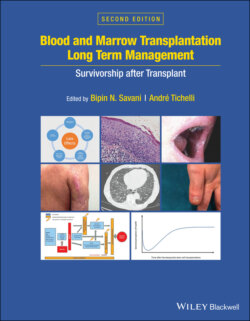Читать книгу Blood and Marrow Transplantation Long Term Management - Группа авторов - Страница 16
Long‐term issues in long‐term survivors
ОглавлениеFor long‐term survivors (beyond 2 years post‐HSCT), the prospect for long‐term survival is excellent (85% at 10 years after HSCT). Yet, among long‐term survivors, mortality rates are four‐ to nine‐fold higher than observed in an age‐adjusted general population for at least 30 years after HCT, yielding an estimated 20–30% lower life expectancy compared with someone who has not been transplanted [19,20]. The most common causes of excess deaths, other than recurrent malignancy, are chronic GVHD (cGVHD), infections, second malignancies, respiratory diseases, and cardiovascular disease and many other late effects reviewed in this book.
cGVHD is a multisystem chronic alloimmune and autoimmune disorder that occurs later after allo‐HCT. It is characterized by immunosuppression, immune dysregulation, decreased organ function, significant morbidity, and impaired survival. A number of patients require continued immunosuppressive treatment beyond 5 years from the initial diagnosis of cGVHD. Therefore, it is not surprising that corticosteroid and other immunosuppressive therapies are major contributors of late complications after allo‐HCT. If not treated adequately, and in severe cases, cGVHD can result in major disability related to keratoconjunctivitis sicca, pulmonary insufficiency due to bronchiolitis obliterans, or restrictive lung disease related to scleroderma or fasciitis, as well as joint contractures, skin ulcers, esophageal and vaginal stenosis, and many other long‐term complications [4,21].
Several factors impact on recovery from and late effects of HCT, including previous therapy for the underlying disease, pretransplant co‐morbidities and psychosocial status, intensity of the transplant conditioning regimen and, most importantly, duration of cGVHD and immunosuppressive therapy [18,22]. Other complications are related to the prolonged use of glucocorticoids and other immunosuppressive drugs, and many are multifactorial in etiology. Side effects of the treatment of acute complications early after HCT (e.g., the use of corticosteroids) may also contribute to long‐term complications. Nearly all organ systems can be affected by late effects of HCT. However, the burden of late effects can greatly differ among long‐term survivors, primarily depending on patient‐ and transplant‐related risk factors.
